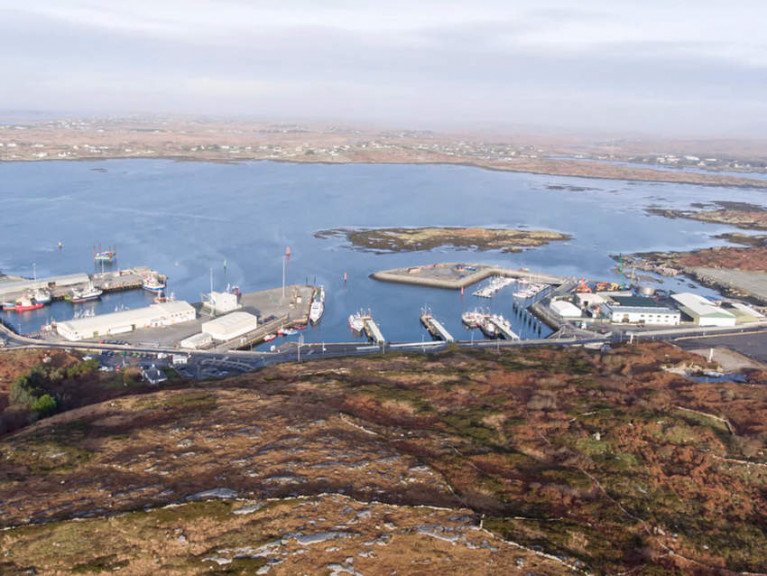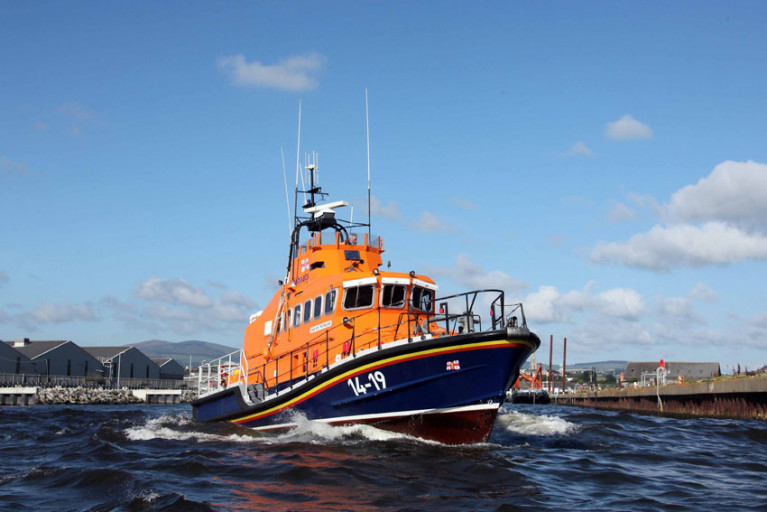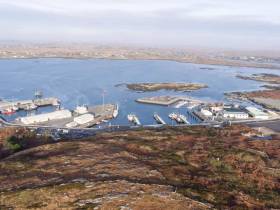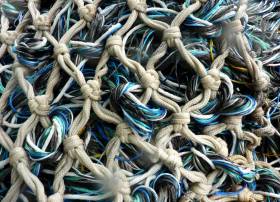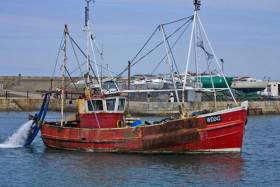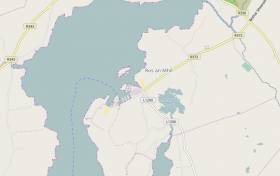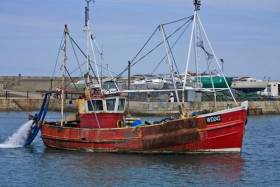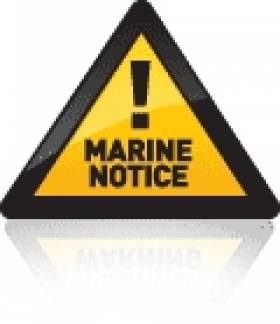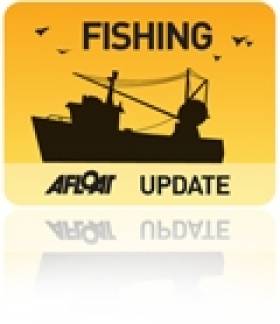Displaying items by tag: Rossaveal
Work has stopped on the extension to Ros-a-Mhíl fishery harbour in south Connemara, following a legal challenge.
As The Irish Independent reports, the 200 metre deepwater quay to facilitate floating offshore wind is three-quarters complete.
The 30 million euro project, for which there was a long campaign, was announced by Minister for Agriculture and Marine Charlie McConalogue in February 2022.
Work had to stop after a legal challenge taken by Peter Sweetman of Wild Ireland Defence CLG over the legality of extended planning permission.
Sweetman told the newspaper that it may have to be removed under European law.
“The application for extension of time by the minister was illegal. Galway County Council granted permission and we took a judicial review of that decision because it wasn’t in accordance with the law. It’s not our problem,”Sweetman told The Irish Independent.
In a response, the Department of Agriculture and Marine confirmed all works at the site had to “cease immediately”.
“The department signed a €30m contract with Ward & Burke Construction Ltd (Contractor) on December 22, 2022 to construct the deep water quay in Ros an Mhíl (Rossaveal) fishery harbour centre, Co Galway,” it said.
“Planning permission for this project was granted in 2018 and due to expire in July 2023, i.e. before the works would be completed.
“Consulting engineers for the department prepared and applied for an extension to the planning authority of Galway County Council in May 2023. An extension of five years was granted on July 11, 2023,”the department statement said.
“In November 2023, the department received papers from the Chief State Solicitor’s office regarding a judicial review of the decision to extend the planning period. The applicant is Wild Ireland Defence CLG, the respondent is Galway County Council. This department is a notice party,”it said.
“The department understands that the matter was most recently before the court on May 14 and at that hearing the court directed that Galway County Council set out its position in writing and submit to the court within one week,”it said.
“Galway County Council has confirmed that it was not going to defend the proceedings. Consequently, legal advice received by the department is that work on site should cease immediately,”the statement continued.
“While the department’s legal advisors are considering the best way forward it is likely that a substitute consent will be required. It is the department’s objective to complete the project and we are working closely with our consulting engineers to ensure that the required steps will be taken as quickly as possible,” it said.
Read more in The Irish Independent here
Connemara Gaeltacht Harbour Could Become Hub for Marine Renewable Energy
Ros an Mhíl/Rossaveal could become a hub for marine renewable energy projects, if plans by Údarás na Gaeltachta come to fruition.
The board of the Gaeltacht authority has recently approved funding to plan the development of a 30-acre site it owns near the Connemara harbour.
Údarás na Gaeltachta says its study will include a review of the marine renewable energy sector and its potential opportunities, as well as “the requirements and advantages that Ros an Mhíl harbour and Gaeltacht companies have to meet future demands and to benefit from same”.
The organisation says renewable energy will be central to its 2021-2025 strategy, which is set for publication early next year, adding that Ros an Mhíl “has been long identified by Údarás na Gaeltachta as a strategic resource”.
Chair of the board Anna Ní Ghallachair said: “We are happy that Údarás na Gaeltachta will be in a position to undertake this study on the opportunities for renewable energy in the Ros an Mhíl area.
“This is a strategic sector for Údarás, and indeed for the whole country. If we are to halt climate change, we must avail of all opportunities there are to generate clean energy.”
Údarás na Gaeltachta hopes to issue tenders on etenders in the weeks ahead so that work can commence early in the new year.
The news comes after similar moves have been mooted for the Shannon Estuary, while in Cork a new strategic partnership aims to improve communication with the wider marine community as the pace of offshore wind farm development picks up.
Aran Islands RNLI has encouraged the public to always call for help when they believe they’ve seen someone in distress at sea.
The message follows a callout across Galway Bay to Rossaveal in Connemara last night (Monday 5 October) that turned out to be a false alarm with good intent.
The volunteer crew launched their all-weather lifeboat at 7.45pm to reports of a flare sighting near Great Mans’ Bay, amid choppy seas with a two-metre swell and 22-knot northwesterly winds.
The crew were joined in the search by Costello Bay Coast Guard and the Shannon-based Irish Coast Guard helicopter Rescue 115.
But after an extensive search of the area by all three rescue services working together, the operation was stood down.
“Thankfully the call out was a false alarm with good intent,” said Aran Islands RNLI press officer Lena O’Connell.
“It is always better to be safe than sorry. The volunteer crew members didn't hesitate to get the lifeboat to the search area as quickly as possible.
“We would remind everyone if you see someone in trouble or see a distress signal, don’t hesitate to call 999 or 112 and ask for the coastguard.”
Site investigation works are to be carried out at Rossaveal Fishery Harbour Centre in Co Galway from mid August.
The works will comprise drilling multiple boreholes at the locations detailed in Marine Notice No 28 of 2019, subject to minor variations.
The drill holes will be in navigable waters off Cashla Bay. In keeping with previous Marine Notices with respect to marine construction works, the areas where the drill rig is to be set up must be kept clear of all obstructions including static fishing gear.
A jack-up barge will be moved to the various borehole locations by a tugboat, and will remain on site overnight during the proposed works. All appropriate lights will be displayed by the barge at night. Radio warnings will be transmitted on VHF Channel 16 throughout the works.
Work is expected to commence in mid-August 2019 subject to the contractor’s precise mobilisation timescales, and last for around four weeks, weather permitting.
A PDF of Marine Notice No 28 of 2019 is available to read or download HERE.
#Fishing - The State’s promise to protect economic links between fishing quotas and local coastal communities is “not happening on the ground”, according to a Rossaveal seafood plant that faces an uncertain future.
Iasc Mara Teoranta managing director Cathal Groonell tells The Irish Times that if the company is unable to find a buyer for its fish processing facilities, it would be forced to close with the loss of 25 jobs.
Groonell’s company claims a significant fall in mackerel and herring landings in Rossaveal is related to the loss of fishing vessels once based out of the Connemara harbour to larger operators in Killybegs, Co Donegal.
Such moves appear to reflect the Department of Marine’s own statement that “concentration of rights into the hands of large companies would seriously risk fishing vessels losing an economic link with Ireland’s coastal communities.”
The Irish Times has more on the story HERE.
Marine Notice: Rossaveal Fishery Harbour Works Continue
#MarineNotice - Marine Notice No 4 of 2017 advises of the continued drilling and blasting of bedrock, construction of breakwater and resentment, installation of piles and pontoons and other associated works at Rossaveal Fishery Harbour Centre.
As previously reported on Afloat.ie, the works commenced on Monday 22 August last with a view to completion in January, but will now continue till July.
All previously notified dumping activities have finished. Drilling and blasting of bedrock, installation of piles, and installation of pontoons is ongoing. These works are
being carried out from causeways, a jack-up barge and work boats.
All vessels will be listening on VHF Channel 16 throughout the project.
Inspectors To Investigate Death In Rossaveal Harbour Incident
#Rossaveal - Galway Bay FM reports that health and safety inspectors are investigating an indecent at Rossaveal Harbour last night (Sunday 29 January) in which a man in his 40s died and another was injured.
The deceased, a Donegal native, is said to have suffered a blow to the head while installing pontoons in the South Connemara harbour west of Galway city, and was pronounced dead later after airlift to Galway University Hospital.
Engineering works have been ongoing at Rossaveal's fishery harbour centre since last August, as previously reported on Afloat.ie.
Marine Notice: Dregding Works At Rossaveal Fishery Harbour Centre
#MarineNotice - The latest Marine Notice from the Department of Transport, Tourism and Sport (DTTAS) advises of the of the dredging of soft material and disposal at sea, drilling and blasting and removal of bedrock, construction of breakwater and revetment and other associated works at Rossaveal Fishery Harbour Centre.
The works by Cronin Millar Consulting Engineers at the Galway Bay fishing harbour will commence on tomorrow Monday 22 August and continue till January 2017.
The first phase of the works, commencing tomorrow, will comprise the construction of a temporary causeway on the foreshore within the dredge site to facilitate excavation of seabed and disposal at a licensed on-shore site.
The second phase of the works, will commence in the coming weeks and will involve a jack-up barge, floating barge, safety boat, personnel boat, split barge and work boats. This will be advised under a second marine notice.
Maps and co-ordinates of the work areas are detailed in Marine Notice No 34 of 2016, a PDF of which is available to read or download HERE.
Other recent Marine Notices cover outfall pipeline remedial works ongoing at the Corrib gas field, and information on the carriage of inflatable life rafts on small fishing vessels under 15m.
Marine Notice: Site Investigation Works At Rossaveal Fishery Harbour Centre
#MarineNotice - The latest Marine Notice from the Department of Transport, Tourism and Sport advises that site investigation works are being carried out at Rossaveal Fishery Harbour Centre on Galway Bay.
The work comprises drilling multiple boreholes at a series of locations, subject to minor variations, as listed in Marine Notice No 65 of 2014, which is available as a PDF to read or download HERE.
Work was expected to begin on Monday 24 November and is set to finish on or around Friday 12 December, weather permitting. A jack-up barge will be moved to the various borehole locations by a tug-boat, and will remain on site overnight during the operations.
All appropriate lights will be displayed by the barge at night. Radio warnings will be transmitted on VHF Channel 16 throughout the works.
Giant Monkfish Among West Coast Fishermen's Strange Catches
#Fishing - Irish fishermen have reported some unusual catches in recent days, according to The Irish Times.
Galway trawler Martins Marie brought home a massive lobster weighting almost 3kg with a carapace of more than 15cm.
But Rossaveal vessel Virtuous did one better on their trip to the Porcupine Bank by landing a giant monkfish that weighed in at 40kg even after gutting.
The Irish Times has more on this story HERE.



























